Back in October of 2015, Synology released the DS216play, and DS216se both of which we reviewed. Today, we will be looking at Synology DiskStation DS216, which is touted as high-performing NAS solution designed for small offices and workgroups. This versatile 2-bay DiskStation includes a hardware encryption engine, which allows it to effectively protect data inclusive of speedy performance. In addition, its use of hot-swappable drive trays to promote easy installation maintenance as well as continuous service uptime should a hard drive need to be replaced. The DS216 also uses the USB Copy button for easy data transmission between external drives and the NAS.
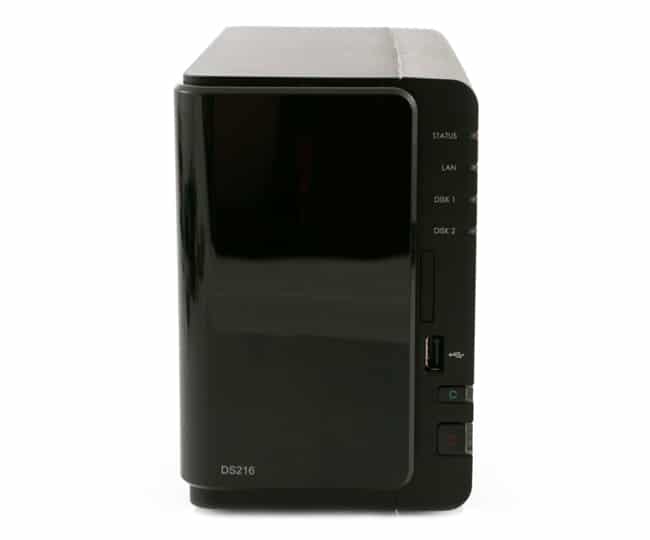
Synology quotes the DS216 with average read and write performance of over 111MB/s configured in RAID 1 using a Windows environment. In addition, the DS216 comes with a built-in floating-point unit to improve the overall performance of the main CPU, which certainly comes in handy for media enthusiasts who need upload large amounts of photos and HD videos. To further its efficiency, Synology has embedded the DS216 with an encryption engine that diverts encryption calculation tasks away from the main CPU, allowing it to focus on other tasks. Additionally, the DS216 is 50% and 110% faster in encryption reading and writing speed, respectively, compared to its predecessor, the DS214.
The Synology DiskStation DS216 is goes for roughly $280 and is backed by a 2-year warranty.
Synology DS216 specifications
- CPU Model: Marvell Armada 385 88F6820
- CPU Architecture: 32-bit
- CPU Frequency: Dual Core 1.3 GHz
- Floating Point
- Hardware Encryption Engine
- System Memory: 512 MB DDR3
- Storage:
- Drive Bay(s): 2
- Compatible Drive Type (See all supported drives)
- 3.5″ SATA III / SATA II HDD
- 2.5″ SATA III / SATA II HDD
- 2.5″ SATA III / SATA II SSD
- Maximum Internal Raw Capacity: 16TB (8 TB HDD x 2) (Capacity may vary by RAID types)
- Maximum Single Volume Size: 16TB
- Hot Swappable Drive
- External Ports:
- USB 2.0 Port: 1
- USB 3.0 Port: 2
- USBCopy
- File System:
- Internal Drives: EXT4
- External Drives:
- EXT4
- EXT3
- FAT
- NTFS
- HFS+ (Read Only, with max. volume size 2TB)
- Size (Height x Width x Depth): 165 mm x 108 mm x 233.2 mm
- Weight: 1.3 kg
- RJ-45 1GbE LAN Port: 1
- Wake on LAN/WAN
- System Fan: 92 mm x 92 mm x 1 pcs
- Fan Speed Mode
- Cool Mode
- Quiet Mode
- Wireless Support (dongle)
- Brightness adjustable front LED indicators
- Power Recovery
- Noise Level: 18 dB(A)
- Scheduled Power On/Off
- Power Supply Unit / Adapter: 60W
- AC Input Power Voltage: 100V to 240V AC
- Power Frequency: 50/60 Hz, Single Phase
- Power Consumption:
- 15.48 W (Access)
- 7.2 W (System Hibernation)
- British Thermal Unit: 52.86 BTU/hr (Access)
- 24.58 BTU/hr (System Hibernation)
- Environment Temperature
- Operating Temperature: 5°C to 40°C (40°F to 104°F)
- Storage Temperature: -20°C to 60°C (-5°F to 140°F)
- Relative Humidity: 5% to 95% RH
- Warranty: 2 years
Design and Build
Like all their NAS solutions, the DS216 consists of a high-quality plastic enclosure with a matt black finish that features the Synology branding on the sides, which double as supplemental ventilation. The DS216 also has rubber pads underneath so that it can be securely placed by your workstation.
The front panel is host to the two drive trays where users have access to install HDDs or SSDs, which is covered by a drive bay panel. To remove, you simply pull off the panel. Each tray also has a drive tray lock to physically secure the drive from being removed.
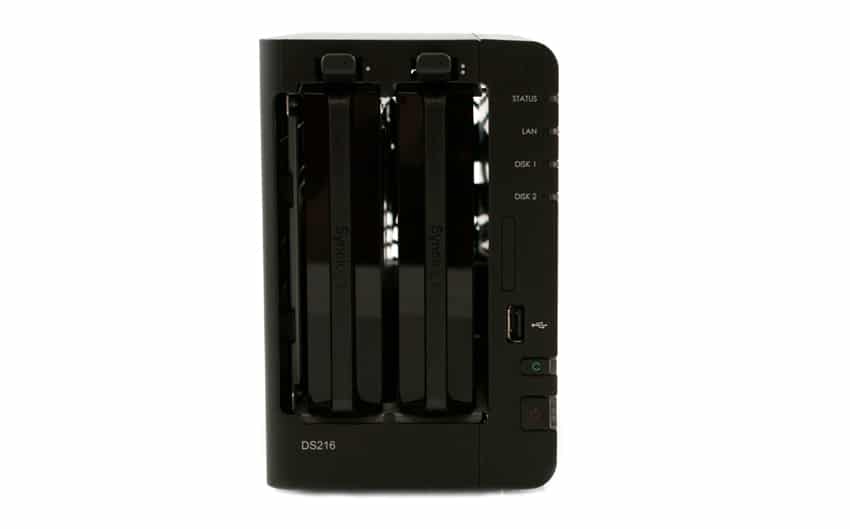
On the right side of the front panel is the Status indicator, which displays the status of the system; the LAN indicator (which displays the status of the network connection); two Disk indicators, which displays the status of the installed drives; and the power button just below. Also on the front panel are a USB 2.0 port–allowing users to connect external hard drives, USB printers, or other USB devices–and the Copy button, which copies all data from the connected USB device to the drives installed drives when pressed.
The back panel shows the large ventilation area of the fan, which disposes of heat to keep the DiskStation cool and running smoothly. If the fan somehow fails, the DS216 will emit a beeping sound. On the bottom are the LAN port, two USB 3.0 ports, and the power port for the AC adaptor. The DS716+ also has a reset button and a Kensington Security slot.
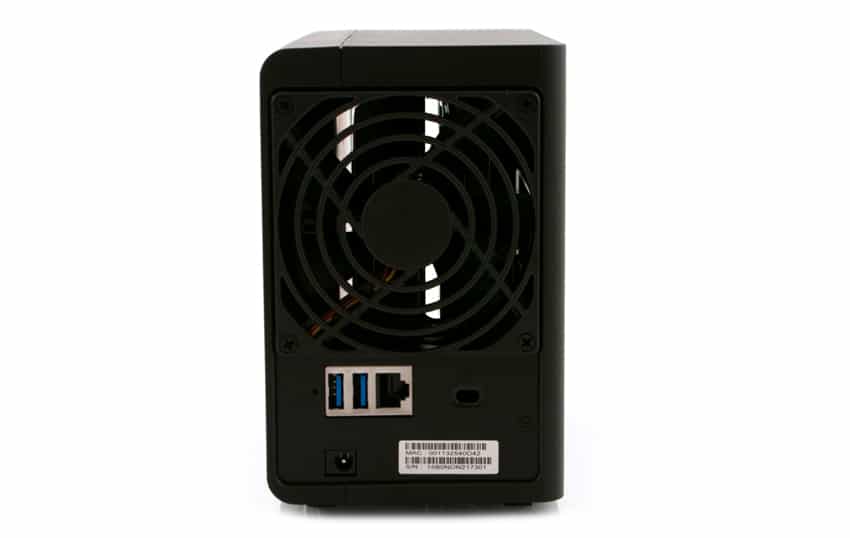
Testing Background and Comparables
We publish an inventory of our lab environment, an overview of the lab’s networking capabilities, and other details about our testing protocols so that administrators and those responsible for equipment acquisition can fairly gauge the conditions under which we have achieved the published results. To maintain our independence, none of our reviews are paid for or managed by the manufacturer of equipment we are testing.
For this review, our enterprise synthetic benchmarks will look at the DS216 populated with 2 6TB WD Red HDDs. The synthetic benchmarks will examine the performance for CIFS and iSCSI protocols, and will be compared to the Synology DS216play and DS216se.
Enterprise Synthetic Workload Analysis
Prior to initiating each of the fio synthetic benchmarks, our lab preconditions the device into steady state under a heavy load of 16 threads with an outstanding queue of 16 per thread. Then the storage is tested in set intervals with multiple thread/queue depth profiles to show performance under light and heavy usage.
Preconditioning and Primary Steady-State Tests:
- Throughput (Read+Write IOPS Aggregated)
- Average Latency (Read+Write Latency Averaged Together)
- Max Latency (Peak Read or Write Latency)
- Latency Standard Deviation (Read+Write Standard Deviation Averaged Together)
This synthetic analysis incorporates four profiles, which are widely used in manufacturer specifications and benchmarks:
- 4k
- 100% Read or 100% Write
- 100% 4k
- 8k (Sequential)
- 100% Read and 100% Write
- 100% 8k
- 8k 70/30
- 70% Read, 30% Write
- 100% 8k
- 128k (Sequential)
- 100% Read or 100% Write
- 100% 128k
In the first of our enterprise workloads, we measured a long sample of random 4k performance with 100% write and 100% read activity, which is how we attained our main results. Looking at throughput, the DS216 had the highest write performance at 363 IOPS when using CIFS; however, it had the poorest read speeds with just 46 IOPS (also CIFS).
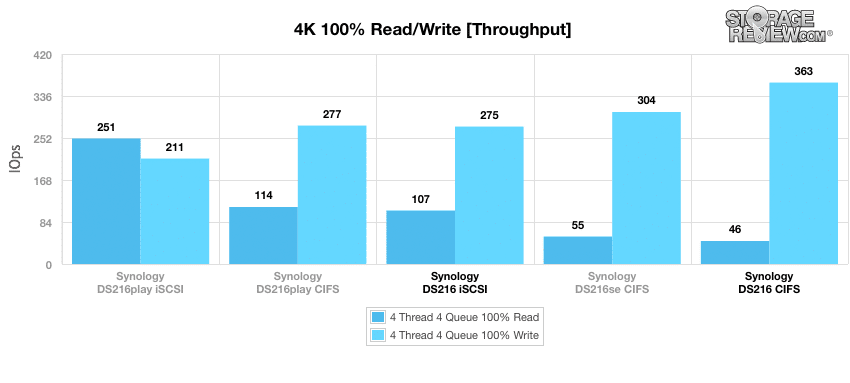
Average latency showed more or less the same, with the Synology DS216 showing the best write performance with CIFS, boasting just 704.66ms, though read latency was very high once again. In iSCSI, the DS216 showed 929.07ms write and 2,369.79ms read.
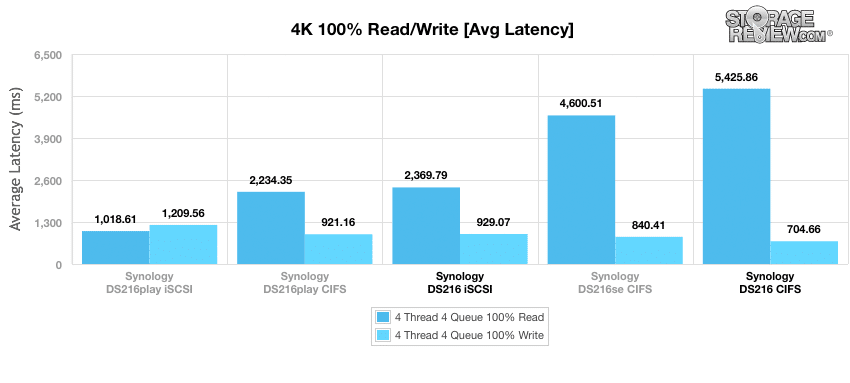
The DS216 posted its best max latency read activity in iSCSI with 7,063ms while writes were much lower (recording 2,975.7ms taking top spot). The CIFS showed fairly high latency with reads and writes at 10,378ms and 12,903ms respectively for the DS216.
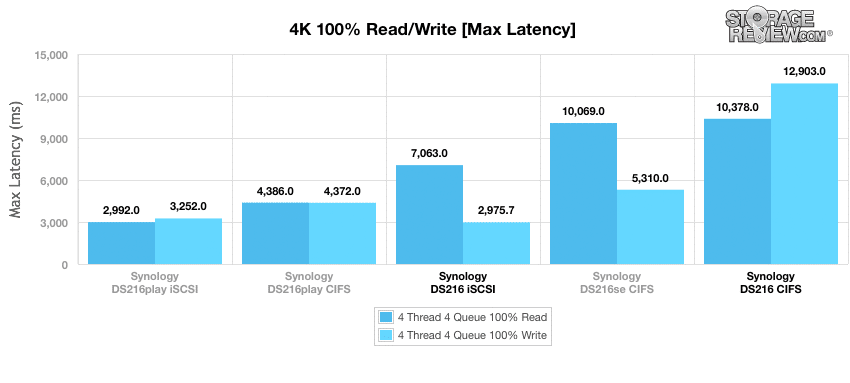
Looking at standard deviation shows the DS216play (CIFS) with the top results with 147.46ms read and 259.42ms write. The DS216 results at the bottom of the pack in the read column with 452.29ms and 1,386.16ms for CIFS and iSCSI, respectively.
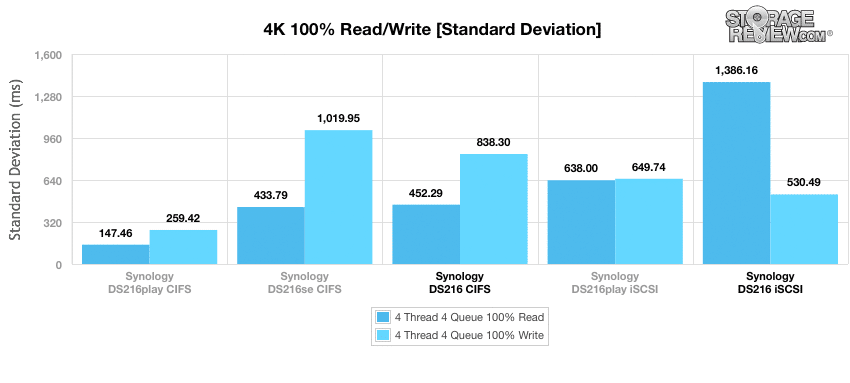
The next benchmark is of 100% 8K sequential throughput with a 16T/16Q load in 100% read and 100% write operations. The DS216 CIFS was the top performer by a noticeable margin in both read and writes, with 10,105 IOPS read and 6,904 IOPS write; however, when using iSCSI, it posted just 393 IOPS when reading.
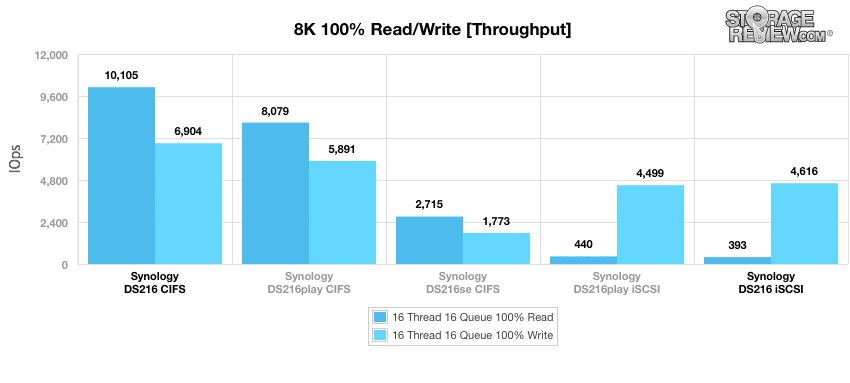
Compared to the fixed 16 thread, 16 queue max workload we performed in the 100% 4k write test, our mixed workload profiles scale the performance across a wide range of thread/queue combinations. Looking at throughput, the DS216 iSCSI posted middle of the run results, ranging between 138 IOPS and 141 IOPS while CIFS posted a range hovering around just 77 IOPS.
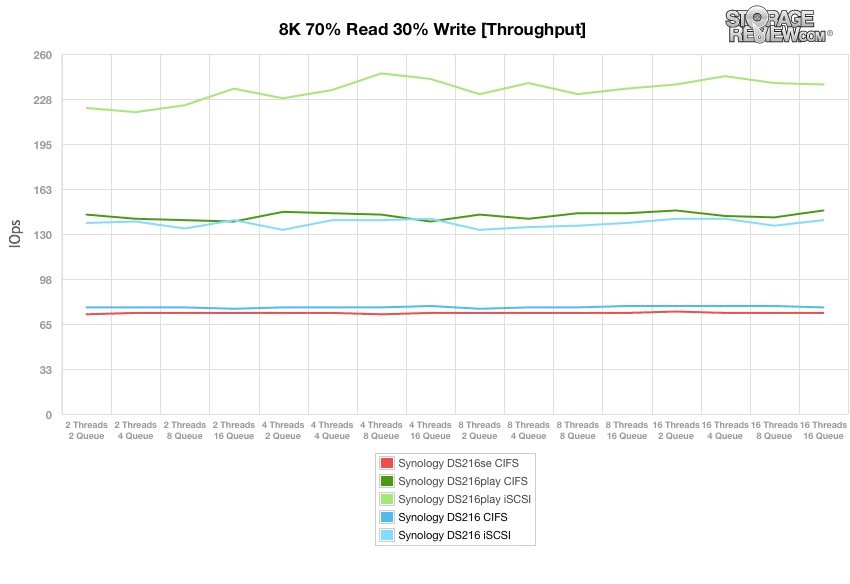
The DS216 iSCSI showed its best performance in average latency; however, it still placed it near the bottom of the pack along with the CIFS.
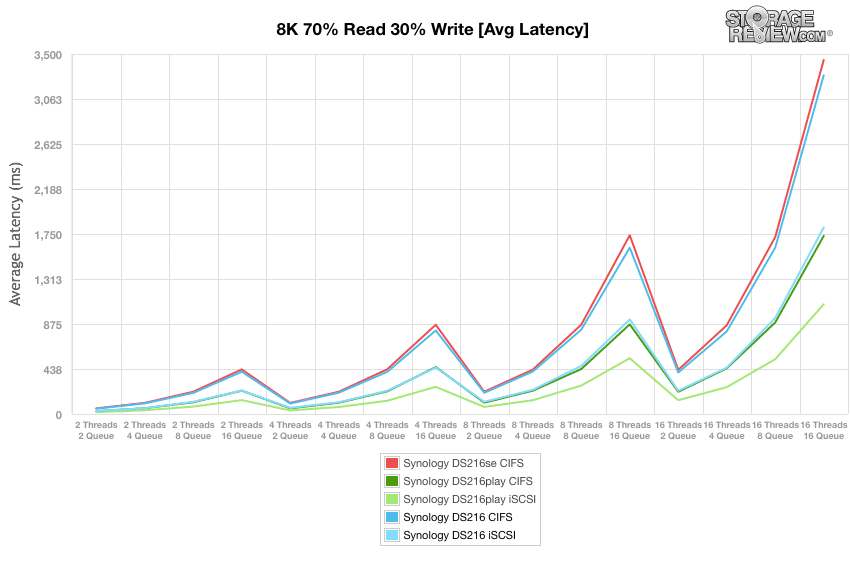
In maximum latency, the DS216 iSCSI showed the best performance at the beginning of the queue depths; however, it ended behind the DS216play (iSCSI) in the terminal.
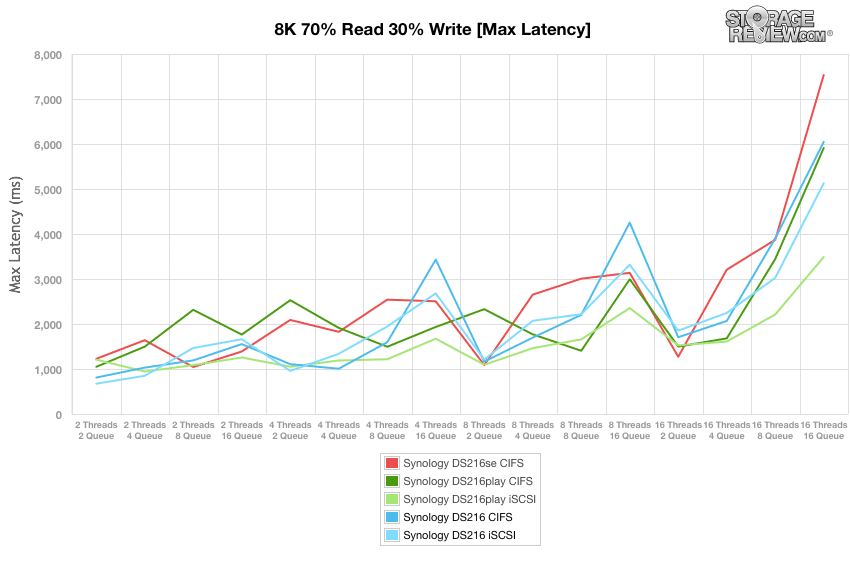
Looking at standard deviation, the DS216 (iSCSI) posted results that placed it well behind the rest of the pack throughout most of the test; however, it picked up its performance when using CIFS, ranging from 27.04ms in burst and 610.2ms in the terminal.
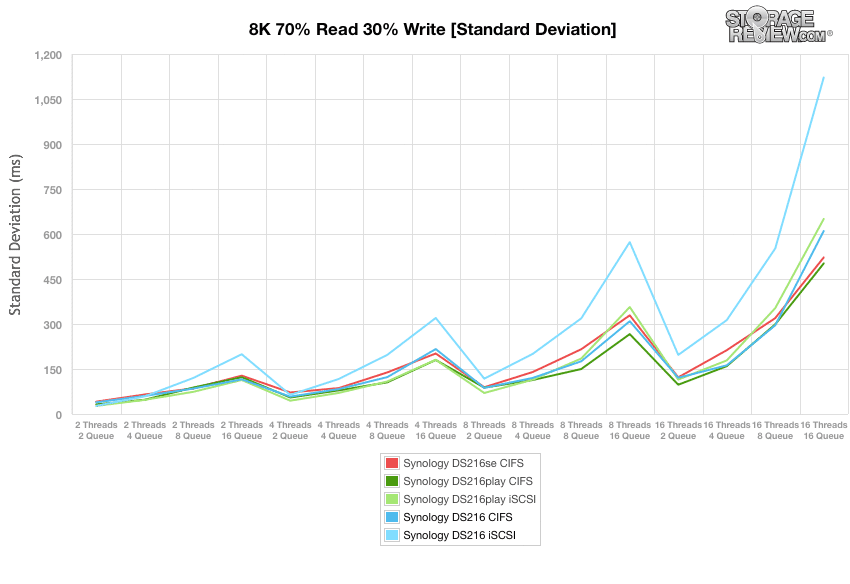
The last test in our Enterprise Synthetic Workload testing is the 128k test, which is a large block sequential test that shows the highest sequential transfer speed for a platter drive. Looking at the 128k performance of 100% write and 100% read activity, the DS216 CIFS posted the highest read speeds at 116MB/s (with 112MB/s in writes) while iSCSI showed top write activity at 113MB/s. That said, iSCSI also had the lowest read speeds at just 27MB/s.
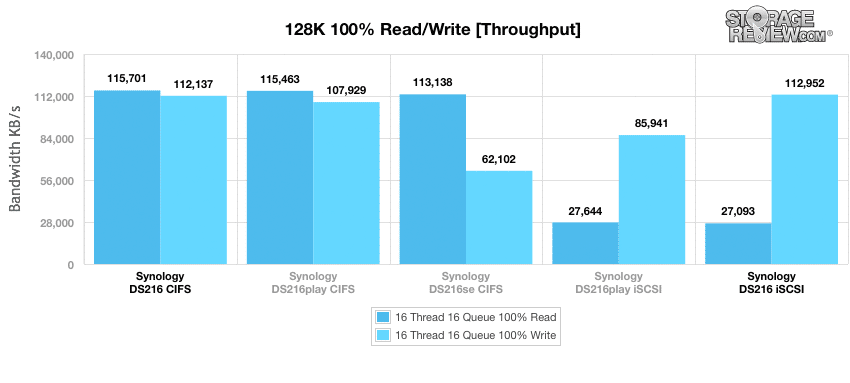
Conclusion
The Synology DiskStation DS216 is certainly a viable choice for use cases such as the home, small offices, and workgroups due to its hardware encryption engine that effectively protect data all the while still focusing on decent performance. It comes with a Dual Core 1.3 GHz processor, 512MB of DDR3 RAM, and up to 16TB of capacity. In addition, the DS216’s use of hot-swappable drive trays promote easy installation and maintenance while its USB copy button allows for easy data transmission between attached external drives and the DS216.
To measure its performance, we tested both CIFS and iSCSI protocols using RAID10 configurations leveraging the WD Red NASware 3.0 6TB hard disk drives. Overall, the DS216 was outperformed by its brethren, the DS216play; however, that was expected due to its slower CPU as well as having half the amount of RAM the play model has. In our 4k workloads, we saw throughput as high as 107 IOPS read during the iSCSI test, while CIFS showed the best write performance with 363 IOPS. When looking at average latency the DS216 showed 2,369.79ms read (iSCSI) and a leading 704.66ms write (CIFS).
During our sequential 8k workload, the DS216 showed top performing read and write speeds using our file-level CIFS, posting 10,105 IOPS read and 6,904 IOPS, respectively, beating out the DS216play by a noticeable margin. Lastly, our large block sequential benchmarks showed maximum read speeds of 115.7MB/s (CIFS) and a top write speeds of 113.0MB/s (iSCSI), both of which were at the top of the leaderboard.
Pros
- Good performance overall
- Powerful DSM interface
- Synology pedigree in reliability and quality
Cons
- Dual LAN would be nice
Bottom Line
Though not as performance driven as some of Synology’s other 2-bay NAS solution, the DS216 is still a versatile, feature-rich DiskStation that offers enough power to suit the needs of small and home offices.
Synology DiskStation DS216 at Amazon

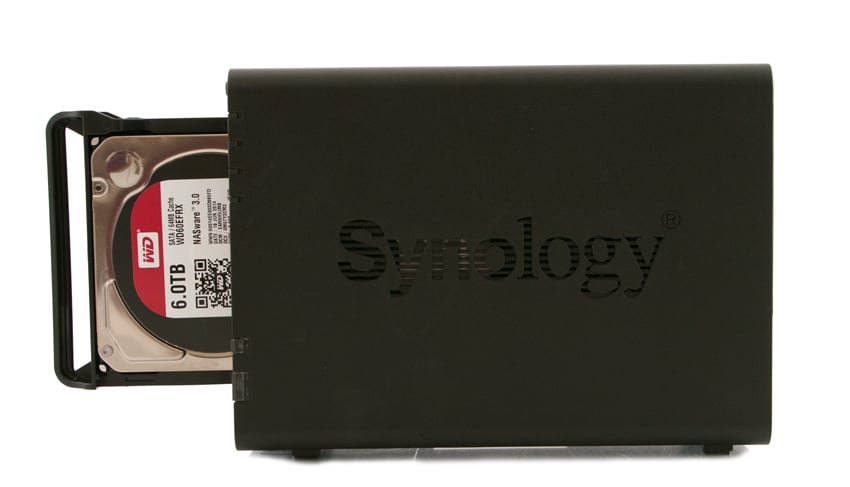


 Amazon
Amazon